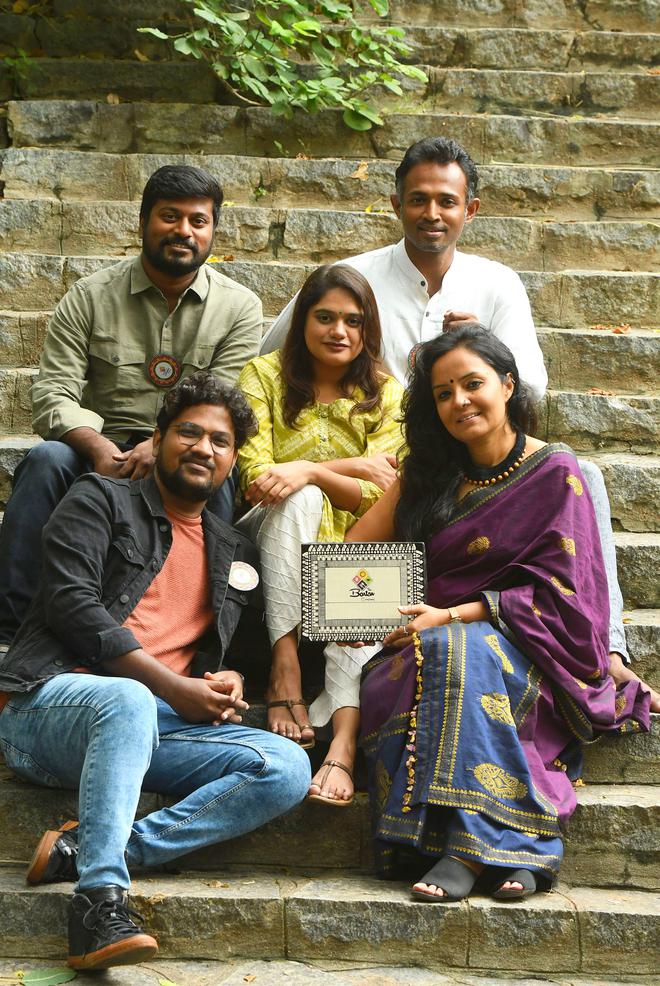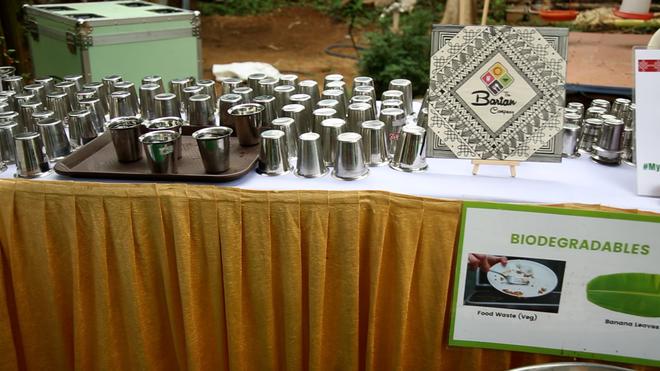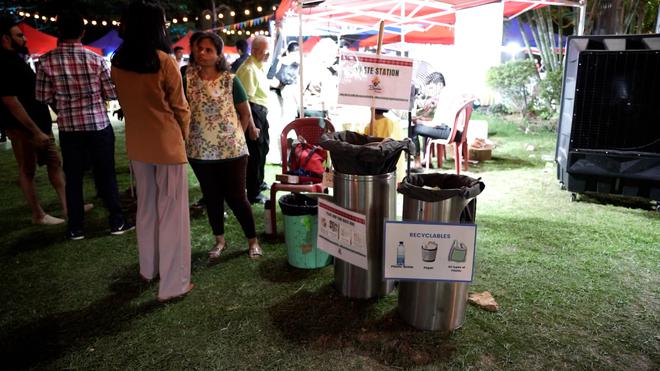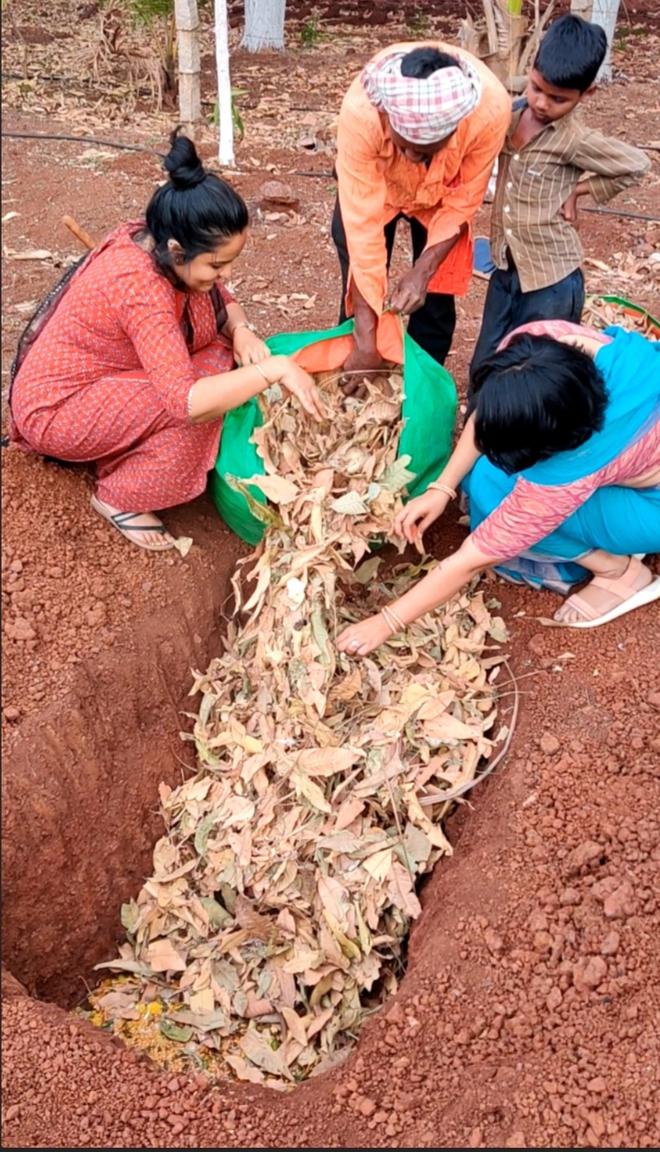Software developer Suguna Alluri was keen that her wedding be a low-carbon-footprint event. She did not want to send mounds of waste to the landfills. Weeks before her wedding in October 2021, she looked to collaborate with green warriors who could help with waste management. Looking online she learnt about The Bartan Company (TBC). Founded in 2018 as a cutlery bank, TBC grew into an entity that helps people incorporate eco-friendly practices in events. They hit it off and began planning. Seed paper was used for wedding invitations, and reusable or biodegradable plates, glasses and cutlery were used at the water and food counters. Waste was segregated at the source and either sent for recycling or composting. Two years later, Suguna looks back with pride at how the guests appreciated the move and later shared images of plants that grew from the seed paper. “It is possible to minimise wastage if you invest time to plan an event,” she says.
For TBC, which wondered if the hesitation towards reusable plates and cutlery during the pandemic would lead to the organisation becoming obsolete, the call from Suguna was a chance to regroup and swing into action.
Pandemic concerns
Nidarshana Saikia Das, TBC’s founding member, says she thought they would not function again. “Everyone was concerned about possible contamination through surfaces. No one wanted to take a chance.” In addition, one of the team had moved to Bengaluru, while another had returned to a corporate job. Nidarshana, who had quit her marketing career earlier, was in no mood to take the corporate route again. She founded Maati Eco Gifts, an entrepreneurial venture to source eco-friendly gift products and thus ensure a revenue stream for TBC.

Meanwhile, Suguna knew she was taking a risk and was anxious since some of her family were sceptical. She recalls how things fell into place one by one. Steel cutlery and biodegradable plates made of sugarcane bagasse were used wherever possible. Steel glasses and water bottles were used at the water counter. Cloth pouches were used to pack return gifts, waste was segregated and guests were encouraged to drop food and biodegradable waste into compost bins with coco peat. The effort paid off with appreciation from the guests.
How does it work?
“Everything we do is a response to demand,” says Nidarshana. Initially, TBC rented plates and cutlery; they grew into a consulting service and began collaborating with stakeholders to organise weddings, birthdays, anniversaries and housewarmings.

“The idea is to reduce plastic wherever possible actively,” says Nidarshana. TBC nudges caterers to bring reusable plates and glasses. “It is not easy, since they will need a few more people to ensure the washing and recirculation of plates and glasses. Some caterers oblige.” Nidarshana adds that the clients who seek them out also opt for simpler decor that ensures less wastage. Florists are encouraged to bring reusable props wherever possible, avoiding polystyrene boards to pin the flowers. “In some cases, the flowers stay good for almost a week. A few florists reuse the flowers for other events at a lower cost. That also helps reduce wastage.”
One step at a time
At the end of every event, the biodegradable waste is composted on-site in pits with the permission of the venue managers. If space is limited or the venue partners are unwilling, the waste is transported in drums to a predetermined location known to the client or TBC members for composting. TBC also collaborates with Waste Ventures and Ahuja Engineering Services for waste processing.
Working around scepticism
Nidarshana reiterates that the effort to reduce carbon footprint needs to be done without inconveniencing the families organising an event. “Not everyone might be comfortable with the idea of having a waste station in the vicinity of the celebration and guests dropping off the waste and the plates in designated bins. We try to make it non-intrusive and fun through smartly designed posters with messages. In a few events, we relented and used plastics that can be recycled. You have to patiently assure family members that things will be taken care of.”

Take the case of vocalist and music teacher Sunayana Godavarthi. When she mooted the idea of a minimal-waste wedding for her sister, their father was concerned about how things would turn out. She and TBC won him over with patient negotiations and ensured that the engagement ceremony with 100 guests and the wedding with nearly 800 guests employed reusable plates, cutlery and glasses. For Sunayana, this mindfulness was an extension of her waste management principles at home.
“After we moved from the USA to Hyderabad in 2014, I noticed that my daughter fell sick frequently and I thought I should do my bit for the environment. We did it one step at a time. There has been no plastic at home since 2017, and we segregate and compost waste, and drop off recyclable waste at Waste Ventures collection points. We have been urging others in the gated community to bring their own plates for community celebrations and for my housewarming ceremony, we followed a no-plastic principle.”
The satisfaction of small measures such as using custom-tailored cloth bags for return gifts, says Sunayana, is immeasurable.
In a way, TBC’s efforts bring back memories of tent house operators who used to be the go-to event facilitators in Hyderabad a few decades ago. In addition to chairs and props, they provided steel utensils, glasses and cutlery for events.
Is it cost effective?
For those who think organising an eco-conscious event might escalate the cost, Nidarshana refrains from drawing a comparison with conventional events but says, “We work according to the client’s budget. To give an estimate, we can organise lunch for 100 people at around ₹10,000 onwards.”
TBC’s core team includes Ragula Sai Abhishek, Rohit Vidyanand, Nidarshana Saikia Das, Vineela Togarrathi, DM Anand, Angel Vinod, Sailaja Kurma and Sahithi Annamraju. They partner with local volunteers for events in other districts. For an event in Khammam, for example, they collaborated with volunteers from the city.
Nidarshana has observed new requests when guests witness effective waste management at an event. “Most of our business happens through word of mouth publicity and our social media accounts.” (The Bartan Company on Facebook; @thebartancompany on Instagram)

She observes that NRI clients are comparatively more inclined to be eco-sensitive. “It is tough to point out the reason, but I think they have a better voice within the family regarding how they want their big day to be celebrated.” Initially, it was the brides who contacted TBC. Later she noticed the bride and the groom partaking in pre-wedding consultations and planning.
The payoffs
To cite an example of how eco-conscious practices can make a difference, TBC shares data from a shopping fiesta event they partnered with, which had more than 10,000 visitors. The waste audit report states that the event avoided using over 15,000 plastic bottles of 200ml each and more than 40,000 single-use plastic cutlery.
Of the total 633 kilograms of waste generated at the event, 89.8% was sent for composting or recycling. The remaining had to be incinerated since it was mixed waste and could not be segregated. “Now imagine the waste that would have ended up at the landfill if not for mindful practices. Such waste audit reports and word-of-mouth appreciation encourage more people to do their bit,” says Nidarshana.







